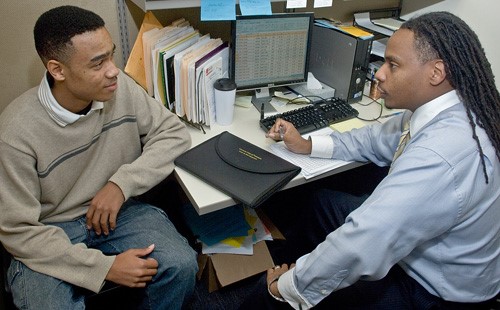Keeping Young Black Males on the Degree Track
Early in 2010, the College Board issued a report warning that nearly two-thirds of young black male college students fail to successfully traverse the educational pipeline. The report, titled The Educational Crisis Facing Young Men of Color, was a call to action for colleges and universities to close the achievement gap for black males.
Community College of Philadelphia already had a potential solution in the works with its Center for Male Engagement (CME), a federally funded program focused on black male students entering their freshman year. CME opened in September 2009 with a target group of 144 black male students from 17 to 19 years old. The students were given access to support coaches, tutoring, life-skills workshops, cultural enrichment activities, and financial assistance as needed.
The strategy showed remarkable success in its first year. Of the 144 students in that 2009 cohort, 90 percent were still attending classes in 2010, more than double the normal 41 percent fall-to-fall semester rate for new black male students at the college. Black males comprised 13.7 percent of the roughly 36,000 students enrolled in 2009-2010.

The college recently received $2.9 million in federal and private grants to continue the work it started in 2009. The U.S. Department of Education's Predominantly Black Institutions program renewed its initial funding for CME with a grant of $600,000 for each of the next four years. A separate $500,000 private grant from the Open Society Foundation was used to launch Project Achieve, a program that expands CME's strategies to a target population of older, nontraditional black male students such as military veterans. "Think of Project Achieve as a subset of the Center for Male Engagement," Hirsch said. "It is building our capacity to serve more students with an organized and focused strategy."
CME and Project Achieve address a troubling issue for many black males who see asking strangers for help as a sign of weakness. "We first have to build that relationship and establish a level of trust before we can open up to talk," said support coach Kevin Covington.
The relationship building begins with Summer Enrichment Programs for black male students who have been identified as eligible candidates under the grant guidelines. These students are then tracked until they leave the college.
The Center's office is a popular haven for students like Aaron Johnson, a second-year Culinary Arts major, who stops by at least twice a day to use the computers, study, or chat with the staff. "The support coaches are like father figures," said Johnson. "You can go in there and talk to them about anything at any time."
Dean of Student Affairs Ronald Jackson said the five full-time support coaches do more than just listen. "They can be very intrusive. If they see students walking down the street and know they should be in class, they are going to call them out. There is no running from the support," Jackson said.
Jackson hopes the Center's work will lay the foundation for a national model that will help more black males succeed in college.
Although the program is designed to support black males, the Center is open to all students who need assistance, regardless of race or age.
For more information, contact Earni Young, eyoung@ccp.edu.
Opinions expressed in Innovation Showcase are those of the author(s) and do not necessarily represent those of the League for Innovation in the Community College.










